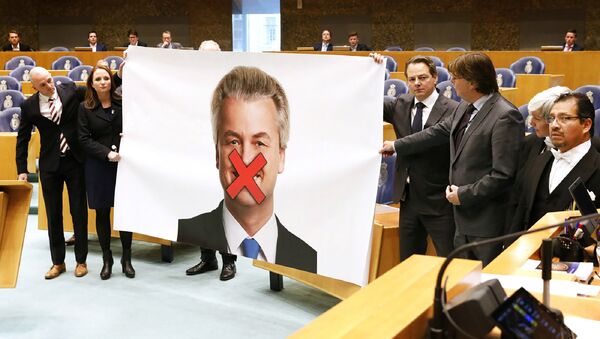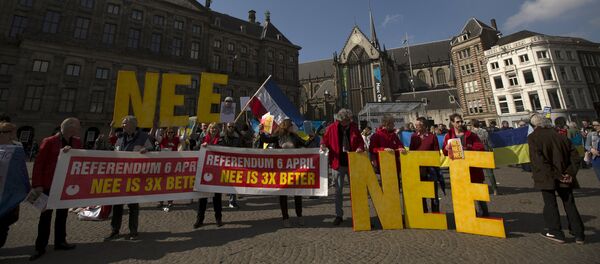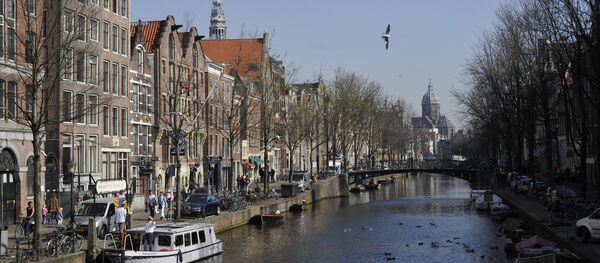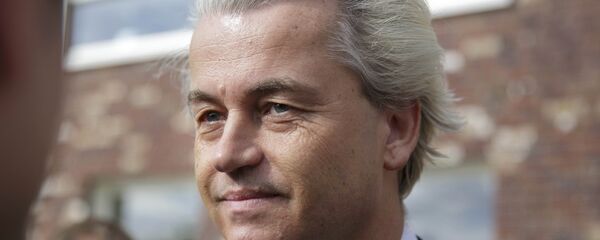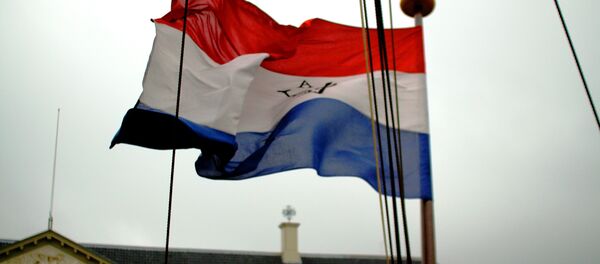MOSCOW (Sputnik) — The popularity of Dutch right wing Party for Freedom (PVV) has been slightly decreasing in the country with experts telling Sputnik that upon parliamentary election the Netherlands most likely to see the third in a row cabinet headed by current Prime Minister Mark Rutte.
POLLS BETS
Earlier in the week, the Dutch broadcaster NOS published the so-called poll of the polls, a mix of five different surveys tracking the popularity of all major parties among the voters.
According to the poll, support for the PVV, projected to get the most votes upon election, was slightly falling after seeing rise for two months in a row. But currently, the party, led by Geert Wilders, is still projected to get most of the votes — some 19.3-22 percent, or an equivalent of 29-33 seats in 150-seat lower house of the Dutch parliament.
Meanwhile, Rutte's ruling center-right People’s Party for Freedom and Democracy (VVD) is still on the second place with projections it would get 23-27 seats in the parliament.
The big loser in polls and presumably in election is the Labor Party (PvdA), traditionally seen as the largest party on the left. Currently the party, which is a junior partner in Rutte’s coalition, enjoys the second-largest share of parliament seats, but since the beginning of 2016 it has been trailing in polls.
In March, as polls predict, the PvdA would secure no more than 12 seats in the next parliament against 35 it has now, lagging far behind the centrists from Christian Democrat Appeal (CDA), Democrats-66 (D66), the most pro-European party in the parliament, that combines progressive social views with liberal economic policies, and GroenLinks, now equally standing on pro-ecological, pro-feminist and pro-pacifist position. Each of the parties would have from 13 to 17 seats.
The parties positions in opinion polls are due to become more evident after TV debates on February 1, where RTL broadcaster plans to invite the four biggest parties' leaders.
PLEDGES ON NON-COOPERATION
Last Sunday, Rutte said that the probability his party will govern together with PVV was "not 0.1, but zero," citing three main reasons why such a partnership was impossible. The first one the prime minister mentioned was the failed cooperation between the two parties in the first Rutte cabinet.
The two politicians collaborated in 2010 when Wilders supported Rutte's center-right minority government, but later withdrew his support and ruined this informal coalition over disagreements on the budget.
In early December, Wilders, who wants to ban all Islamic symbols, mosques and the Quran in attempts to stop the Islamization of the Netherlands, was found guilty of discrimination after asking supporters during a 2014 election rally whether they wanted fewer Moroccans to move into their country. The court imposed no fine or sentence on the PVV leader, while much ado surrounding Wilders led to his popularity ratings going up.
Previously, the PvdA, CDA, D66, GroenLinks and far-left Socialist Party, now the third largest parliamentary party, all ruled out working with the PVV.
The only party that did not rule out cooperation with Wilders – though only out of tactical considerations — is 50plus Party, representing interests of elder generation. On Tuesday, its leader, Henk Krol, wrote a big opinion piece in de Volkskrant newspaper, where he explained that excluding Wilders from any coalition in advance would only motivate more people to vote for PVV.
"50Plus is emphatically opposed to helping the PVV get more votes," Krol stated.
Meanwhile, Wilders, who last year stated that cooperation with Rutte was possible only if the latter stepped from the party leadership, this week called the prime minister's pledge not to cooperate with PVV "an offense to millions of voters and smells of dictatorship."
While most of parties do not want to deal with the far-right PVV, not all of them are eager to work with the Rutte’s VVD as well. This week, Socialist Party leader Emile Roemer stated that his party would not collaborate with VVD due to unbridgeable political differences, though two parties have been cooperating on good terms at local level.
The newly elected Labor leader, Lodewijk Asscher, speaking to Trouw newspaper on Saturday, said he could not exclude cooperation with VVD upon March elections, but called it "not a logical choice."
NEXT COALITION?
Most analysts believe the Rutte’s VVD will form a government again but due to fractured nature of Dutch political system any likely coalition would require as many as five parties.
"This is difficult to predict at the moment. But going by current polls, a coalition that does not include the PVV will need to have, at least, five parties. There could be a centrist coalition including VVD, D66, CDA, PvdA and a smaller party. Or a center-right coalition: VVD, D66, CDA, 50Plus and a smaller Christian party," Rem Korteweg, senior research fellow at the Centre for European Reform, told Sputnik, adding that any coalition formed after the election could be quite unstable and the Dutch may be asked to go to the ballot box again soon.
Ko Colijn, senior researcher at the Hague-based Clingendael Institute think-tank, also suggested that the third Rutte cabinet was a "well foreseeable" option upon the election with four or five participating parties, considering the need to ascertain majority government in the Senate as well.
"As to the Labour, the party will probably resist and play hard to get, but in the end decide for the 'illogical', i.e. participate [in the coalition with VVD]," Colijn told Sputnik.
Both experts agreed that CDA and D66 will be the kingmakers at the elections.
"But so could a fringe party like ‘50Plus’, which is a special interest party targeting those aged ‘50 and over’ and is doing exceptionally well in the polls," Korteweg added.
The party, that won two seats at the 2012 general election, is on target to take some 10 seats this year with speculations that the pension age may rise by a further three months likely to further boost the party’s popularity.
Korteweg suggested such a situation would not definitely disappoint Wilders.
"After all, this gives him power without responsibility – especially if he is the country’s largest party: he will be too large to ignore, and he would continue to set the tone of political debate and, in many respects, the political agenda. But, in opposition, it means that he will avoid having to take any responsibility associated with being in government, and the necessary consensus-making this involves. So he can stick to his core message and complain from the sidelines," the expert of Centre for European Reform asserted.
POLITICAL OVER-ACTIVITY
There is no electoral threshold in the Netherlands so political parties are flourishing. In 2012, last time when the country held parliamentary election, 21 parties competed for entering the lower house with just ten being qualified for seats. Bur later 10 parties turned into 17 political groups as high number of lawmakers split from the parties they were elected on with 42 Dutch parliamentarians resigning since 2012.
In 2017, 82 parties have registered to stand the March election. The long list also included political party called Denk, or "Think," established two years ago by two Dutch-Turkish members of parliament with aim to represent immigrants' interests.
Denk promises to create a national racism register and track hate speech as well as build a slavery museum in the Netherlands. The party's social and economical program is not clear, but still it may easily turn into powerful political force given the fact that about a million out of 17-million Dutch population have immigrants roots, being children or grandchildren of guest workers from Morocco and Turkey, that the Netherlands actively attracted in 1960th.

